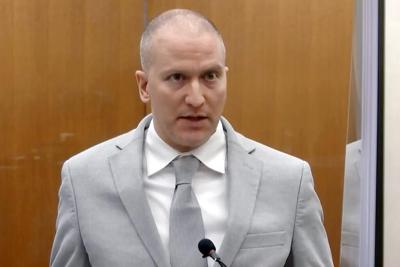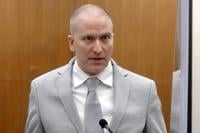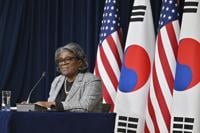MINNEAPOLIS (AP) — The Minnesota Court of Appeals on Monday upheld former Minneapolis police officer Derek Chauvin's second-degree murder conviction in the killing of George Floyd, and let his 22 1/2-year sentence remain in place.
Chauvin's attorney to throw out the ex-officer’s convictions for a long list of reasons, including the massive pretrial publicity. He also argued that legal and procedural errors deprived Chauvin of a fair trial. But the three-judge panel sided with prosecutors who said Chauvin got a fair trial and just sentence.
, after Chauvin, who is white, used his knee to pin the Black man’s neck to the ground for 9 1/2 minutes. A bystander video captured Floyd’s fading cries of “I can’t breathe.” Floyd’s death touched off protests around the world, some of which turned violent, and forced a national reckoning with police brutality and racism.
“Police officers undoubtedly have a challenging, difficult, and sometimes dangerous job. However, no one is above the law," Appeals Judge Peter Reyes wrote for the panel. "When they commit a crime, they must be held accountable just as those individuals that they lawfully apprehend. The law only permits police officers to use reasonable force when effecting a lawful arrest. Chauvin crossed that line here when he used unreasonable force on Floyd.”
Minnesota Attorney General Keith Ellison, who assembled the prosecution team, said in a statement that he was “grateful we have a system where everyone, no matter how egregious their offense, is entitled to due process and fair treatment."
“The Court’s decision today shows once again no one is above the law — and no one is beneath it,” Ellison said.
A voicemail and emails were sent to Chauvin’s attorney, William Mohrman. He argued on appeal that the trial judge should have moved the case out of Minneapolis because of extensive pretrial publicity and unprecedented security precautions due to fears of violence.
“The primary issue on this appeal is whether a criminal defendant can get a fair trial consistent with constitutional requirements in a courthouse surrounded by concrete block, barbed wire, two armored personnel carriers, and a squad of ������ϲʹ������� Guard troops, all of which or whom are there for one purpose: in the event that the jury acquits the defendant,” Mohrman said in oral arguments in January.
But Neal Katyal, a special attorney for the state, argued that Chauvin got “one of the most transparent and thorough trials in our nation’s history."
Hennepin County Judge Peter Cahill sentenced Chauvin to 22 1/2 years after jurors found him guilty of second-degree murder, third-degree murder and second-degree manslaughter. Chauvin later pleaded guilty and was sentenced to 21 years in federal prison, which he is now serving in Arizona concurrent with his state sentence.
“Judge Cahill managed this trial with enormous care, and even if Chauvin could identify some minor fault, any error is harmless,” Katyal said. “The evidence of Chauvin’s guilt was captured on video for the world to see.”
Mohrman argued that the pretrial publicity was the most extensive of any trial in Minnesota history, and that the judge should have moved the trial and sequestered the jury. He said the publicity and the riots, the city’s $27 million settlement with Floyd’s family announced during jury selection, the unrest over a police killing of a Black man in a Minneapolis suburb during jury selection, and the sealing off of the courthouse, were just some of the factors prejudicing Chauvin’s chance of a fair trial.
His appeal also focused on one juror who participated in a civil rights event commemorating the Rev. Martin Luther King Jr.’s March on Washington, a few months after Floyd’s death. Only after the trial did the juror reveal that he had been there.
But the appeals court ruled that Cahill did not abuse his discretion in deciding those issues.
Local defense attorney Mike Brandt, who has followed the case closely, said he was not surprised that the appeals court affirmed Chauvin’s conviction and found no errors that would have changed the outcome. Appellate courts give judges wide discretion and are loath to micromanage how they run trials, he said. He added that Cahill created a solid record to justify the decisions he made in a “high-pressure case where literally the eyes of the world were on him.”
The appeals court declined to address whether it was legally permissible to convict Chauvin of third-degree murder. The defense said a 2021 Minnesota Supreme Court decision case that clarified the definition of that crime meant the law no longer fit the facts of Floyd's killing. But the appeals court noted that the trial judge never formally adjudicated that conviction nor did he sentence Chauvin on that count.








































